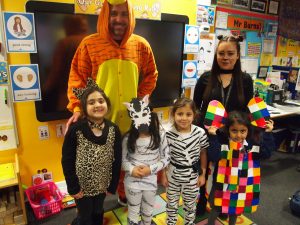Writing
What does Writing look like at AHPS? (Intent)
At Avanti House Primary School, our mission is to nurture children who are confident and creative communicators, ready to thrive as lifelong learners and make a positive impact on the world. We’re passionate about fostering a genuine love of language and reading, ensuring every child feels inspired by the power of words. Through our engaging text-based approach, we make learning enjoyable and meaningful. Our curriculum is thoughtfully designed to reflect the goals of the National Curriculum for English, seamlessly integrating language skills into both English lessons and across all subjects, giving your child a well-rounded education.
How do we do this? (Implementation)
We are dedicated to helping our students become confident and passionate writers, able to express themselves in many different styles and situations. Our lessons are filled with exciting opportunities to:
- Explore cross-curricular connections that bring writing to life through our class topics.
- Write for a variety of purposes and audiences, helping children see the value of their words in different contexts.
- Engage in meaningful writing tasks that are designed to capture their interest and show how writing skills can be applied in the real world.
- Dive into a rich mix of genres throughout the year, sparking creativity and broadening their writing abilities.
- Strengthen grammar skills, weaving them naturally into lessons and providing focused teaching when necessary.
- Take part in “Talk for Writing” activities like role play, hot seating, and creating actions, making writing even more fun and interactive.
With these approaches, we aim to inspire every child to write with confidence and enthusiasm!
What difference does it make? (Impact)
At Avanti House Primary School, we believe that every child progresses at their own pace, starting from where they are and building on their unique strengths. As they grow, they will become confident writers, able to express their ideas clearly, accurately, and coherently. They’ll learn to adapt their language and style to suit different contexts, purposes, and audiences, ensuring their writing always shines.
By the end of Year Six, our pupils will not only write with clarity and precision, but they will also be able to tailor their writing to meet a variety of needs. With an extensive vocabulary and a strong command of the written word, they will develop a true love of writing that will serve them well throughout their education and beyond. Most importantly, they will be ready to use their writing skills to make a positive difference in the world!
How to Support Your Child at Home:
- Use VCOP (Vocabulary, Conjunctions, Openers, Punctuation) to help your child uplevel their writing. Encourage them to experiment with different words, sentence structures, and punctuation to make their writing more exciting and engaging.
- Write diaries and recounts together: Encourage your child to write about their day, special events, or family holidays. This not only helps with writing practice but also encourages reflection and creativity.
- Enter creative writing competitions: Inspire your child to take part in local or online creative writing competitions. This gives them a fun, goal-oriented way to practise writing and boosts their confidence.
- Read together regularly: Reading is a great way to inspire writing. Share stories, poems, or articles and discuss the different writing styles and techniques used. This can spark new ideas for their own writing.
- Create a writing space: Set up a special, quiet place at home where your child can focus on writing. This will help them develop a routine and treat writing as a creative and enjoyable activity.
- Discuss different writing styles: Talk about various forms of writing like letters, poems, instructions, and stories. Help your child experiment with these styles to see how versatile writing can be.
- Celebrate their writing achievements: Praise their efforts and display their writing around the home. When children feel proud of their work, it motivates them to keep writing.
By actively engaging with your child’s writing journey, you can help nurture their skills and foster a love for expressing themselves through words!
Reading
What does Reading look like at AHPS? (Intent)
At Avanti House Primary School, reading is at the heart of our curriculum. We are passionate about helping our children become articulate, imaginative communicators, equipped with the skills they need to become lifelong learners and make a positive impact on the world. Our goal is to nurture a genuine love for language and the written word by providing a literacy-rich environment, high-quality texts and inspiring learning opportunities.
By the end of their primary school journey, we want all our children to read fluently and confidently, prepared to tackle any subject in secondary school. To help them achieve this, we encourage our pupils to read widely across both fiction and non-fiction genres. This not only broadens their knowledge of themselves and the world around them but also deepens their appreciation for reading, strengthens their understanding across the curriculum, and enhances their comprehension skills.
How do we do this? (Implementation)
At Avanti House Primary School, we encourage children to explore a wide range of genres, sparking their curiosity and love for reading. We help them build an extensive vocabulary and develop a strong understanding of grammar and linguistic conventions, all through fun, vocabulary-focused activities woven into daily lessons. This includes guided reading, introductions to key texts, and spelling practice.
We also aim to instil a deep appreciation for our rich and varied literary heritage, introducing children to a diverse selection of texts that celebrate the beauty of storytelling. Through ‘Talk for Writing’ opportunities, children are encouraged to use their voices creatively, exploring expression and expanding their vocabulary through role-play, discussions, and writing.
To make learning even more engaging, we create a “hook” for each text, sparking curiosity and excitement in every child. Discussion is key—by talking through their thoughts, ideas, and understanding, students clarify their thinking and learn to elaborate on their ideas clearly and confidently.
Throughout the year, we celebrate special themed weeks such as National Storytelling Week and World Book Day, offering fun, immersive experiences that inspire a love of stories and creativity.
What difference does it make? (Impact)
At Avanti House Primary School, our goal is to help children develop a true love for reading. The impact of this will be clear: they will make significant progress, sustain their learning, and acquire valuable skills that will serve them well in the future. With our well-established and thoroughly taught writing journey across both key stages, children will grow into confident writers. By the time they reach Upper Key Stage 2, they will be familiar with most genres of writing, and our teaching will focus on nurturing their creativity, honing their writer’s craft, and refining their grammar and punctuation skills.
Through termly assessments, we are proud to see that most children at Avanti House are meeting age-related expectations in English. Each year, we celebrate children who achieve greater depth in both reading and writing by the end of Key Stage 1, and we are committed to continuing this success through to Key Stage 2. All of the exciting new literacy initiatives we’ve introduced will play a key role in enhancing children’s learning and supporting their ongoing progress.
How to Support Your Child at Home:
- Read together daily: Set aside 20 minutes each day to read with your child. This shared time not only strengthens their reading skills but also fosters a love of books and stories.
- Ask questions: After reading, discuss the story with your child by asking questions to check their understanding. This helps develop their comprehension and critical thinking skills.
- Practice echo reading: Take turns reading aloud, with you reading a sentence or passage first, and your child echoing you. This method builds fluency and confidence in their reading.
By making reading a fun and interactive part of daily life, you’ll help your child grow into a confident and passionate reader!
Poetry Week
This year’s theme was ‘Resilience and Courage’. Take a look at the video where you can see all of this year’s winners. The children worked extremely hard to showcase performing with resilience and courage, as well as writing poems based on resilience and courage. We are so very proud of all the children and in awe by the content they produced! We look forward to next year’s poetry week!
Sponsored ‘Readathon’
In celebration of World Book Day, Avanti House Primary children were invited to take part in a ‘Readathon’. They were asked to read as much as possible for 2 weeks and ask people them to sponsor them for reading. Many children across the school took part and we raised a total of £1450 which we will now spend on books for our classrooms!
Well done to Mia from Reception Laughing Ladybirds for raising a total of £301!
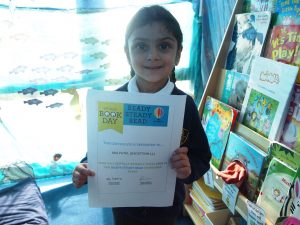
Mia Reception LL
World Book Day
Avanti House Primary School children celebrated World Book Day. Children used their creativity to create their own Eco-friendly costumes based on their key text. Prior to WBD, children created puppets for the characters of their key text and used these to perform puppet shows for their class. Year 4 performed a fantastic puppet show to the entire school!
All children took part in paired reading with older/younger children. “I really enjoyed reading with Reception pupils because we don’t get to spend much time with the younger children. We could explain words and help them read books properly. It was such a nice experience.” (Hemi Bhatt Year 4 HH). World Book Day was indeed a memorable day for all our children! We would like to thank all the parents/carers who supported children with their creative costume making and for encouraging your child to take part in all activities.
Here are some quotes by children about WBD:
I think the best part of the day was when we got to read with a class because that really boosted my confidence. (Halle Year 3GG)
The best part of world book day was when we got to make our own puppets based on Charlotte’s web. (Dhruv Year 3GG)
Reading with the little children was fun because we got to see their outfits and we read together. Also, I made a new little friend that day! (Aryan Year 4 RR)
I really enjoyed the puppet shows because it gives us a chance to summarise the story in a fun way (Mehek Year 4 HH).
I liked the part where we had to think about who has the most eco-friendly costume because it looks to global warming and recycling (Aashi Year 4 HH)
My favourite part was when we did the puppet show. (Bella Year 1 DD)
My favourite part was seeing everyone’s eco-friendly costumes because we didn’t but it, we got to make it ourselves. (Parshvi Year 1)
We were making puppets with socks and we did puppet shows! (Sneh Year 1TT)
I liked the puppet show and I liked reading with the big kids. (Dhriti Reception BB)
I liked the voting because I got a certificate. (Aanushi Reception BB)
I liked making stories with the sock puppets. (Ameya Reception LL)
I liked playing the quizzes because it had lots of questions. (Krupa Year 2PP)
I liked WBD because we got to do different things. (Leeya Year 2PP)
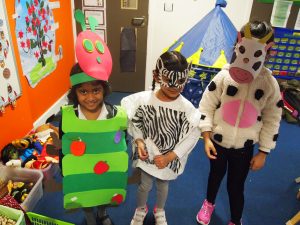
Book Corner Competition Winner: Year 1 TT!
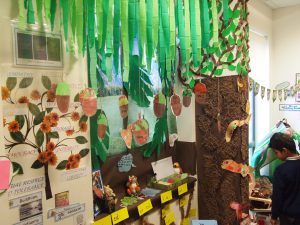
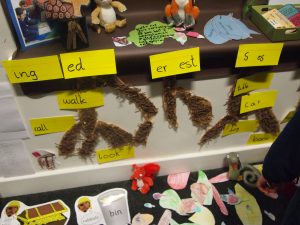
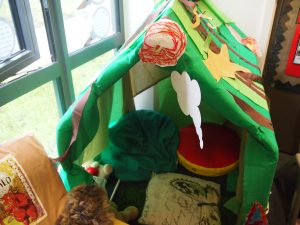
Year 1 TT worked together to create an inviting, vibrant book corner based on their key text, “The Gruffalo” by Julia Donaldson.
Many other classes also worked hard to create a stimulating book corner for their classes. Have a look at the images below!
Reception Busy Bees
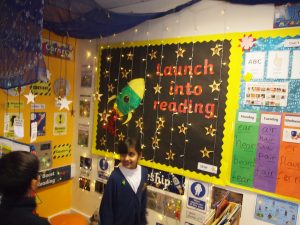
Year 2 Fabulous Flamingos
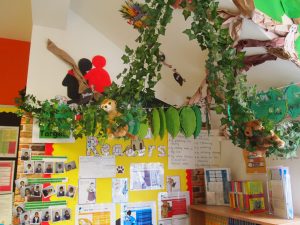
Year 2 Precious Peacocks
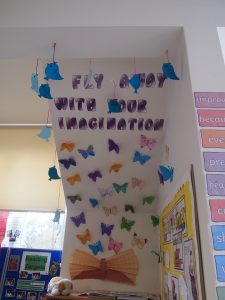
Year 3 Gentle Giraffes
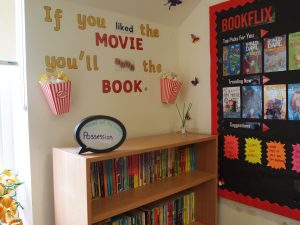
Year 3 Kind Kangaroos
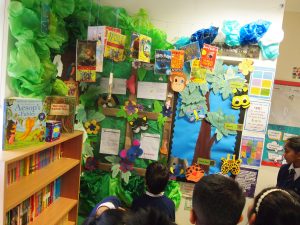
Year 4 Respectful Rhinos
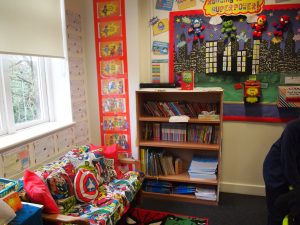
Our Fabulous Whole-School Story Book
To celebrate World Book Day at Avanti House Primary children took part in a variety of exciting activities. One of the most enjoyable activities was to write a whole-school story book as a whole class. The story was initiated in Reception classes who set the scene and then gave their first part of the story to Year 1 and so forth. Every class got an opportunity to read what the children before them had written and to then continue the story using their own imaginative and creative ideas.
Once the children had written their story as whole-school, they were asked to create illustrations for their part of the story. A few illustrations were chosen from each class and have been included in the whole-school story eBook (see below).
Please click on the link below to read our entire story!
Whole School Story eBook
The ABC’s of Reading
A look at the Primary phase reading strategy
The Avanti House Reading Strategy takes into account the Government’s expectation that all children should leave primary school able to decode words and have a ‘love of reading’. We have devised a strategy to build on synthetic phonics as one effective approach to develop children’s reading but also draw from an Australian research project which culminated in a programme called First Steps. This presents reading behaviours and attitudes in a less linear way and shows how in different phases there are different and complex processes involved in understanding how to read and the meaning behind reading.
| PRIMARY PHASE READING STRATEGY | |||
| PHONICS | GUIDED READING (DIRECT TEACHING OF READING) | READING FOR PLEASURE | SUPPORTING EMERGING READERS
STRETCHING CONFIDENT READERS |
| • Twinkl Phonics Programme (Reception to Year 2)
• Daily reading (Class teachers, LSA’s and volunteers) • Regular synthetic phonics sessions from Reception to Year 2 |
• Learn to read (focus is on learning to read for meaning and develop children’s comprehension)
• Twinkl Phonics Rhino Readers Scheme (home readers levelled books-online and sent home) |
• Annual Book Week
• Annual Shakespeare Week • High quality book corners in every class room • High quality library in each school with wide selection of books, including multimedia texts • Books chosen by children and taken home weekly • Home Reading Record/parent training • Book bags for every child |
• Identified children/new starters/ EAL and SEN focused support using Reading Recovery
• Reading Support (group reading programme) • Bespoke interventions including comprehension. |
| ATTITUDES TO READING * | ||||
| Phase 1 | Phase 2 | Phase 3 | Phase 4 | Phase 5 |
| PHONICS | GUIDED READING (DIRECT TEACHING OF READING) | READING FOR PLEASURE | SUPPORTING EMERGING READERS | READING FOR PLEASURE |
| • Curiosity about printing and mark making
• Wants to look at books • Points at text, has a go • Expresses enjoyment • Eagerly anticipates book-reading • Plays out characters in stories |
• Talks about their own reading
• Asks for favourite stories to be read • Joins in and acts out stories • Selects books to read for pleasure |
• Has a go at reading own words
• Enjoys listening to stories • Reads for a range of purposes (pleasure & information) • Responds sensitively to stories • Discusses favourite books, authors • Selects own reading material according to interest • Reconstructs information gained |
• Self-motivated to read
• Reads for range of purposes • Responds sensitively • Discusses favourite books, authors, particular genres • Makes comparisons with other texts • Confidence to read a wide selection of texts • Reads alone for prolonged periods of time |
• Avidly pursues a favourite author, books compared and recommended
• Feels strongly about reading preferences • Totally absorbed when reading & reads for long periods at home and at school • Sees books and text as a major source of information • Strongly relates to characters in fiction |
* Phases drawn from Indicators for Reading Development Continuum, First Steps
| WEEKLY READING LEARNING AND TEACHING | ||||
| TAUGHT PHONICS | GUIDED READING (DIRECT TEACHING) OF READING) | READING FOR PLEASURE | ALL TEACHING SESSIONS | SUPPORTING EMERGING & STRUGGLING READERS
STRETCHING CONFIDENT READERS |
| • ½ hour Phonics session taught in whole group session. This is using the Twinkl Phonics scheme which a government validated Phonics programme. As children progress at different rates, children will be supported in catch up groups. The main teaching is as whole class however (Teachers and TAs trained in Phonics)
• Repetition & consolidation activities planned for during free-flow and independent activities. |
• Guided reading sessions throughout continuous provision (LSA’s and Teachers)
• Phonics Bug Reading Scheme (home readers levelled books) (EYFS use this from Spring 1 onwards) • Twinkl Phonics Reading Scheme-Rhino Readers (home readers levelled books) • Teaching assistants will change children’s phonics reading books weekly. (EYFS start this in Autumn 2) Children read their phonics levelled book to the TA/adult, who assesses confidence and identifies another book to support phonic learning or moves child to next level. (Led by TAs under Teacher’s supervision) |
• As well as Phonics Levelled books being sent home, books chosen by children once a week at the library can be taken home
• Home Reading Record to record reading experience at home. • Story time each day for children during which teacher and other adults share their joy of reading. High quality texts with opportunities for children to read, act out, sing and listen. |
• Will provide opportunities for children to read. Text on IWB. Children invited to read along.
• Key Vocab on display and used throughout sessions • Literacy Learning Wall identifies focused language and sounds. Referred to by adults and children. • Teaching demonstrates the excitement of stories and the importance of finding out information • Everyone is celebrated as a reader. Adults are vigilant to identify how children have been successful in their reading development. |
• Identified children/new starters/ EAL and SEN and G&T focused support |
| ASSESSING PHONICS AND READING | ||||
| TAUGHT PHONICS | GUIDED READING (DIRECT TEACHING) OF READING) | READING FOR PLEASURE | ALL TEACHING SESSIONS | SUPPORTING EMERGING & STRUGGLING READERS |
| • Twinkl Phonics assessments (termly)
• Assessment informs groupings for Phonics sessions (particularly in later phases) |
• Guided Reading assessment format completed and children tracked
• Running Record |
• Home Records show reading at home
• They identify children’s enjoyment of texts |
• Lesson monitoring
• Shared best practice • Learning Walls discussed by children – direct impact on children’s learning |
• Tracking children
• Reading record completed after each session to inform planning and teaching |


